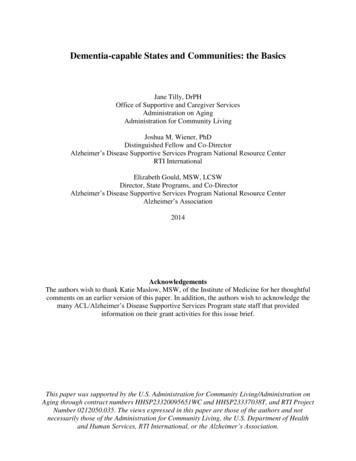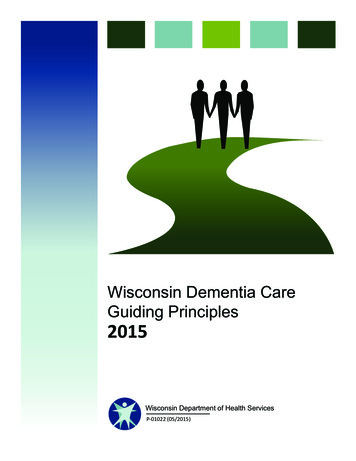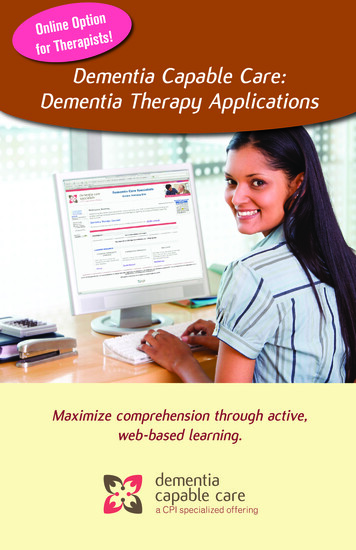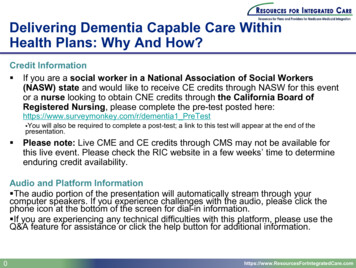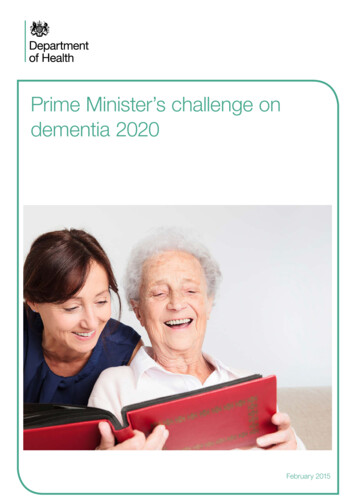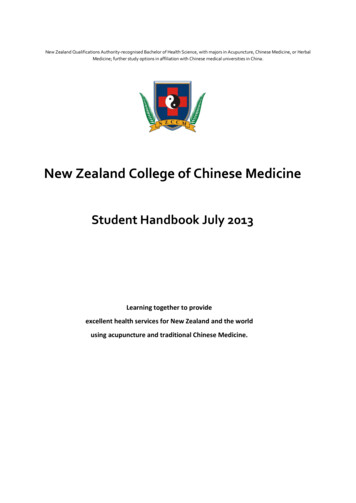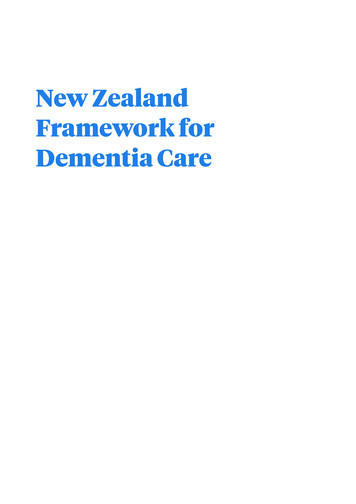
Transcription
New ZealandFramework forDementia Care
AcknowledgementsWe would like to acknowledge the significant time and effort contributed by the sector advisory groupin developing this New Zealand framework for dementia care (the framework). The group comprisedrepresentatives from each district health board, the National Dementia Cooperative and primaryhealth care services.We would also like to thank the following organisations for their support:Age Concern New ZealandMiranda Smith HomecareAlzheimers AucklandAlzheimers New ZealandNew Zealand Association of OccupationalTherapists (NZAOT)The University of AucklandNikau House and wellness serviceAuckland University of Technology (AUT)Nutrition MattersBupa Care Services New ZealandRelaxed TherapyThe University of CanterburyThe Royal New Zealand College of GeneralPractitionersDementia Care NZDistrict health boards (DHBs)Healthcare of New ZealandIHC New ZealandKatikati Medical CentreRyman Healthcare LtdThe Selwyn FoundationTe Hopai TrustWaitemata PHO.Finally, we would like to acknowledge the valuable input we received from people with dementia andtheir families and whānau and would like to thank Alzheimers Auckland for coordinating the groupsessions for us.Citation: Ministry of Health. 2013.New Zealand Framework for Dementia Care.Wellington: Ministry of Health.Published in November 2013by the Ministry of HealthPO Box 5013, Wellington 6145, New ZealandISBN 978-0-478-41500-1 (print)ISBN 978-0-478-41501-8 (online)HP 5689This document is available at www.health.govt.nz
ForewordNew Zealand has a growing number of olderpeople. For most, their older years will be activeyears, with many working longer and remaininginvolved in their local communities. However, anincreasing number of older people will also havehealth problems that require support.Dementia is a key example. As our ageingHon Tony RyallHon Jo Goodhewpopulation grows, there will also be an increase inthe number of people with dementia. In 2011, just over 48,000 New Zealanders had dementia.By 2026, it is estimated that over 78,000 New Zealanders will have dementia.1 This is an increaseof over 60 percent.More people with dementia will lead to an increase in costs. It is estimated that in 2011 the totalfinancial cost of dementia in New Zealand was 954.8 million. This figure includes the costs ofresidential care, pharmaceuticals, and general practitioner visits, as well as productivity loss and theloss of healthy years of life. As the population with dementia grows, the financial and social costs willtoo. So we need to be prepared.The Government is determined to make a difference in the lives of people with dementia, their families,whānau, friends and communities. Action today will improve the wellbeing of our older people now,and prepare us for the future.In 2012 the Government provided 2.5 million a year to district health boards (DHBs) to developdementia care pathways to better support people with dementia and maximise their independenceand wellbeing. The Ministry of Health has led a national project in partnership with DHBs,non-governmental organisations, people with dementia, and other groups across the country to createa national framework to guide the development of these pathways.The framework aims to provide the person with dementia with the services they need, from diagnosisto the end of life stage. The framework encourages different health and social services to work togetherto provide people with integrated care. It emphasises services that take into account a person’s wishes,cultural preferences and lifestyle. It also encourages health professionals to diagnose dementia earlierto ensure people can get the help they need as soon as possible.We encourage DHBs to involve all stakeholders in the development of their dementia care pathways. Itis vital that those whose lives are most affected by the journey of this disease are involved.We thank everyone who has been involved in the development of the framework, particularly peoplewith dementia and their carers who so willingly provided comment and input to the fabric of theframework.Hon Tony RyallMinister of Health1Hon Jo GoodhewAssociate Minister of HealthAlzheimers New Zealand’s Dementia Economic Impact Report 2012New Zealand Framework for Dementia Careiii
Socialising in the communityThe Group (run by AlzheimersWhanganui) meets the social needsof people with dementia living in thecommunity through everyday activities,while also giving their carers sometime out.The Group is finding that being out andabout, using community organisationssuch as the museum and indoor bowlingclubs, means that they are breaking downthe stigmas associated with dementiaas people see the person and not theirdisability.This photo shows two members of TheGroup on one of their regular outings.The ladies have no family nearby andloved the opportunity to hear and sharethe excitement of the young girl’s storyabout her birthday.ivNew Zealand Framework for Dementia Care
Why the framework was developed1Issues associated with dementia1Purpose of the New Zealand Framework for Dementia Care3New Zealand Framework for Dementia Care5Principles of the framework7Following a person-centred and people-directed approach7Providing accessible, proactive and integrated services that are flexible to meet a variety of needs 7Developing the highest possible standard of care8Overarching factors9Education and training for people with dementia and their families and whānau9Workforce education and training9Readily accessible information9Governance10Family and whānau support10Culturally appropriate services10Funding streams11Monitoring and evaluation11Advocacy11Key elements13Awareness and risk reduction13Assessment, diagnosis, early intervention and ongoing support15Assessment15Diagnosis18Early intervention and ongoing support21Living well24Meeting challenges to maximise wellbeing31End of life42Glossary45References and bibliography49New Zealand Framework for Dementia Carev
Walking groupAlzheimers Auckland had a groupof people with dementia express aninterest in walking at the BotanicGardens, mostly because they couldtake their dogs and enjoy the greatcafé. Now the group meets everyweek and everyone enjoys the timethey get to socialise together.
IntroductionWhy the framework was developedNew Zealand has an ageing population and an increasing number of people with dementia. In 2011, therewere an estimated 48,182 New Zealanders with dementia, an increase of 18 percent since 2008. By 2026,this number is estimated to have increased to over 78,250 (Alzheimers New Zealand 2012). The Ministryof Health (the Ministry), together with the health and social support sector, recognises that dementiacare needs to be improved nationwide in a way that maximises the independence and wellbeing of theperson with dementia and their family and whānau while ensuring safety and affordability of services.To this end, the Ministry has developed a national framework for dementia care.Issues associated with dementiaThis framework seeks to address a number of issues currently associated with dementia.There is generally a negative social stigma associated with dementia. Many people are afraid of beingdiagnosed with dementia because they believe that nothing can be done to help them once they havebeen diagnosed (Alzheimer’s Disease International 2012). Some health practitioners are reluctant tomake a diagnosis as they feel they do not have the training to provide a diagnosis and/or are unaware ofthe information and support services available to increase a person’s wellbeing after diagnosis (Ahmedet al 2010; Aminzadeh et al 2012). The framework aims to improve the information available, dispel themyths about dementia and ensure that the health and social support sectors, people with dementiaand their families and whānau are adequately educated about the realities of dementia and the typesof support available to maximise independence and wellbeing.Many people with dementia currently receive a diagnosis from a secondary health service at a moreadvanced stage in their illness. A later diagnosis means that the person with dementia often misses theopportunity to identify and communicate what is important to them because they may be no longerable to communicate their wishes and preferences. A late diagnosis can also increase stress on theperson and their family and whānau because they have not had access to the education and supportservices that can help them minimise or avoid symptoms of dementia (Aminzadeh et al 2012). Thiscan create challenges such as depression, anxiety, behavioural and psychological symptoms and carerstress. The framework aims to encourage awareness of dementia and reduce the stigma attached toit. It encourages people to seek an earlier diagnosis to give them the opportunity to maximise theirwellbeing and identify their wishes for the future by developing an advance care plan and appointingan enduring power of attorney.Currently, a specialist service usually diagnoses a person with dementia. However, the increasingnumber of people with dementia is likely to add pressure to these specialist services. Primary healthcare services need to be better able to provide earlier diagnosis and appropriate care and support forpeople with dementia and their families and whānau. Primary health care practitioners need betterknowledge, support and tools to have the confidence to make earlier diagnoses in the communitysetting (Aminzadeh et al 2012). An early diagnosis by a primary health care practitioner will free upspecialist services to respond to episodic events and provide support and advice to the primary healthcare services in complex cases.New Zealand Framework for Dementia Care1
People who are diagnosed with dementia often experience an uncoordinated and/or duplicatedresponse to their care and support needs. This can cause confusion and stress for both the person withdementia and their family and whānau. Care and support services need to be better integrated andeasier to navigate through.In the past, people living with dementia have been treated with only a medical model of care, whichdoes not maximise the person’s wellbeing and independence. Overseas, models of care have movedtowards a more integrated approach that includes both health and social aspects of care. In NewZealand, although we have started moving in this direction, we still have a long way to go. Supportservices need to take into account the spiritual, family and whānau, cultural, economic, social andoccupational needs as well as the health needs of the person with dementia to maximise the person’sindependence and wellbeing.A further factor driving the development of this framework is the belief that dementia is an olderperson’s condition and, on the whole, dementia services have been developed to support older people.However, dementia affects a variety of people, including younger people, people with Down syndromeand people with alcohol and/or drug addictions. Appropriate information, education, sector knowledgeand services need to be developed with these groups in mind.Dementia care must also consider the needs of Māori and other ethnicities. There is a myth that onlya small number of Māori develop dementia because Māori life expectancy is shorter than that of NewZealand Europeans. However, in 2011, of the estimated 48,182 New Zealanders with dementia, 1970(4 percent) were Māori, and by 2026, the number of Māori with dementia is expected to have increasedto 4493 (5 percent of the estimated 78,267 people with dementia) (Alzheimers New Zealand 2012).Māori also have a higher rate of risk factors for dementia when conditions such as depression, headtrauma, and substance abuse disorders are considered (Ministry of Health 2011b). The health andsocial support sectors need to work in partnership with Māori to develop health and social supportsthat appropriately reflect the cultural needs of Māori with dementia.It was anticipated that there would be a strong Māori involvement in the development of thisframework. However, despite every effort, this was not achieved. The dementia care workforce doesnot have strong Māori representation amongst clinicians, and this issue needs to be addressed byfocusing on increasing the number of Māori working in dementia services. To ensure an authenticand prominent Māori voice is included in the development of dementia care pathways it is hoped thatDHBs will work with Māori in their communities to ensure they are developing services that will beused and valued by Māori.In 2011, 1838 (3.7 percent) of the estimated 48,182 people with dementia were Asian and 930(1.9 percent) were Pacific peoples. By 2026, the share of European/other people with dementiais expected to drop and those of all other ethnicities are expected to increase. Of the estimated78,267 people with dementia in New Zealand, 6568 (8.4 percent) are expected to be Asian and 2051(2.6 percent) are expected to be Pacific peoples (Alzheimers New Zealand 2012). There are manycultural reasons that may prevent families and whānau from seeking support for family memberswith dementia. For example, some non-European ethnicities attribute the symptoms of dementiato the ‘normal’ ageing process. Some ethnicities, particularly migrant families, may not completelyunderstand dementia and see it as a mental health diagnosis, which can carry a great deal of shameand prevent families from seeking intervention and treatment for the person with dementia. In somecultures, it is important for elders to be looked after by their own family or whānau. Such culturalfactors may delay families and whānau seeking support, leading to a lack of understanding of thedifficulties faced by the person with dementia and increased stress for both the carers and the personwith dementia.2New Zealand Framework for Dementia Care
There can also be issues with language and communication. Effective communication is critical for allpeople with dementia as they experience a gradual deterioration in their ability to organise and expresstheir thoughts. Communication issues can be even more significant for people from culturally andlinguistically diverse backgrounds who may not be able to communicate with service providers in theirpreferred language.Lastly, people with dementia are sometimes treated as if they are unable to communicate or participatein conversations and decisions about their care and support. However, there is strong evidence that anengaging and respectful partnership between the health and social support service providers and theperson with dementia and their family and whānau that focuses on clearly informing and encouragingself-determination and involvement in the development and provision of services will improve theexperience of care and outcomes and reduce costs by maximising independence and wellbeing (MentalHealth Commission 2012).Purpose of the New Zealand Framework forDementia CareThe framework was developed using international evidence, good practice resources, expert opinionand conversations with people with dementia and their families and whānau.It aims to help people with dementia and their families and whānau to maximise their independenceand wellbeing by reducing stigmas and providing clear, comprehensive information and an integrated,holistic approach to dementia care and support.To this end, it provides a guide that district health boards (DHBs) can use as they work with primary,secondary and community health and social support services (including social, information,emergency and housing) to develop clear, consistent, well-resourced and easily accessible dementiacare pathways.The framework promotes national consistency in dementia care while allowing for flexibility to adaptto local priorities and encourage innovation. DHBs are already developing their own service modelsand pathways for dementia care, and this framework is deliberately non-prescriptive so that the DHBswill be able to use it in different ways to achieve the same ends. The framework lists good practiceexamples that DHBs and the health sector can refer to, but the list of examples is a guide only and is byno means comprehensive.Furthermore, the framework highlights some goals that may take time to achieve. It is anticipatedthat steady progress can be made towards these goals with the ultimate aim of significantly improvingdementia health and support services within five years.In the 2012/13 annual planning process, the Ministry asked DHBs to develop their own dementiacare pathways by June 2013. In the 2013/14 year, DHBs are expected to implement their dementiacare pathways and develop regional governance groups. The Ministry’s annual planning process willmonitor the progress of the development and implementation of these pathways. The developmentand implementation is expected to be undertaken in collaboration with the primary health care andcommunity care sectors and to align with this framework. The framework can also be used to guideworkforce training, planning and recruitment and retention.New Zealand Framework for Dementia Care3
Sharing memoriesSome activities of TheGroup, run by AlzheimersWhanganui, spark memoriesamong its members. Forexample, the man in thisphoto lived in Hollandas a young boy and bikedeverywhere. His dad hada bicycle repair business,which was run from theshed at home.By riding the bike manyhappy memories weretriggered, which made thisexperience very positive forhim and other members ofThe Group listening to himshare his story.
New Zealand Frameworkfor Dementia CareThe framework provides DHBs and the health and social support sectors with a guide for developingtheir dementia care pathways. The framework has three guiding principles and highlights five keyelements for effective dementia care. It also identifies overarching factors that must be consideredacross all five key elements. The figure below provides an overview of the framework.Figure 1: New Zealand framework for dementia care overviewNew Zealand Framework for Dementia CareVisionPeople with dementia, their family and whānau are valued partners in an integrated health and socialsupport system. They are supported throughout their journey with dementia to maintain and maximisetheir abilities, optimise their sense of wellbeing and have control over their circumstances.Principles Following a person-centred and people-directed approach Providing accessible, proactive and integrated services that are flexible to meet a variety of needs Developing the highest possible standard of careOverarching factors Education and training for people with dementia and their families and whānau Workforce education and training Readily accessible information Governance Family and whānau support Culturally appropriate services Funding streams Monitoring and evaluation AdvocacyKey elementsAwareness and risk reductionAssessment, diagnosisearly intervention andLiving wellongoing supportMeeting challengesto maximisewellbeingEnd of lifeNew Zealand Framework for Dementia Care5
Jeff and his best friendDaisyJeff is a member of theAlzheimers Auckland’sBotanic Gardens walkinggroup. Jeff and his dog Daisycan normally be foundleading the group. Daisyloves attention and helpsbreak the ice among thegroup members, encouragingthem to talk to each other.She also loves sitting onJeff’s lap while the groupsocialise at the café aftertheir walk.6New Zealand Framework for Dementia Care
Principles of theframeworkFollowing a person-centred andpeople-directed approachHealth and social support services ensure that people with dementia and their families and whānau: are respected, valued and engaged as partners in care planning and provision of services receive clear communications and education that enable them to be engaged at all levels ofdecision-making, including care planning and provision of services are able to self-determine many aspects of their lives consent to all decisions about their care and support are empowered to participate in decisions and choices that affect them (regardless of their capacity) receive care and support services that respond to their social, cultural, spiritual and economicbackgrounds; location; symptoms and disease progression needs; preferences and goals even afterthey have reduced capacity or are legally incapacitated have their rights upheld.Providing accessible, proactive and integratedservices that are flexible to meet a variety ofneedsHealth and social support services promote earlier recognition of dementia and participationwithin their communities. They aim to provide a positive experience of care and support bystrengthening the culture of partnership and engagement with both the person with dementia andtheir family and whānau. The services are: readily accessible and proactive flexible so they can respond to the individual needs of the person with dementia and their familyand whānau, including social and economic needs supportive of the choices made by the person with dementia and their family and whānau provided by appropriately trained staff culturally appropriate age appropriate holistic dementia friendly in both their physical environment and service provision.New Zealand Framework for Dementia Care7
The services are integrated so that: service models are adapted to meet local needs and are supported by local and regional dementiacare pathway governance structures care planning is consistent, coordinated and flexible across all services (including DHBs, primaryand secondary health care, government organisations, non-government organisations and privatesector organisations), ensuring seamless continuity of care and support interdisciplinary assessment and care planning focuses on functional, psychological and socialgoals gaps in services that cannot be filled locally are met by a sub-regional or regional approach the person with dementia’s care team is responsible for identifying a suitable navigator1.The services focus on: early intervention maximising health improvement, maintenance and independence supporting people with dementia and their families and whānau to live with a sense of wellbeing gaining appropriate consent and making sure that appropriate processes are followed where theperson with dementia lacks the capacity to consent (eg, enduring power of attorney, personal orderor welfare guardian).Developing the highest possible standardof careServices will be developed with the aim of providing: the right services, at the right time and in the right place a standard of excellence in dementia care and support that aligns with international trends andstandards and uses evidence and best practice models a skilled workforce continuity of care and support with affordable, efficient and safe services national or regional standardisation and consistency of dementia care, with local variations.18See Key elements: Assessment, diagnosis, early intervention and ongoing support: Early intervention and ongoing support onpage 17 for information on the navigator role.New Zealand Framework for Dementia Care
Overarching factorsThe factors outlined below need to be provided across all areas and stages of dementia care.Education and training for people withdementia and their families and whānauEducational and training opportunities for people with dementia and their families andwhānau should: be developed following the principles set out in Rauemi Atawhai: A guide to developing healtheducation resources in New Zealand (Ministry of Health 2012) be provided throughout the person’s life with dementia emphasise the positive aspects of living with dementia acknowledge the value of being physically active use plain language address different learning styles and abilities, including English as a second language acknowledge cultural differences and values.Workforce education and trainingEducational and training opportunities for the health and social support services workforce fordementia care should: be based on best practice focus on the meaning of a people-centred and people-directed approach (Mental HealthCommission 2012) include input from people with dementia and their families and whānau include experiential learning address different learning styles and abilities, including English as a second language recognise the different needs of cultural diversity and cultural groups and finds ways to addressthose needs respond to the needs of people with co-existing conditions and/or impairments be supported by the health and social support service providers.Readily accessible informationResources should: be developed following the guidelines set out in Rauemi Atawhai: A guide to developing healtheducation resources in New Zealand (Ministry of Health 2012) be developed through national and regional collaboration use plain English be available in different languages accommodate physical impairments (eg, poor eyesight, hearing loss) be easily accessed and be provided in more than one medium wherever possible be reviewed and updated regularly.New Zealand Framework for Dementia Care9
GovernanceDHBs should develop regional and local governance groups to: help implement their dementia care pathways in line with the framework ensure that a wide range of expertise (eg, secondary care, primary health care, allied health,community services, volunteer services, family and whānau) is involved in developing dementiacare pathways and services at the local and regional level ensure that new models of care, good practice examples and research are shared locally, regionallyand nationally develop measureable outcomes of the pathways’ effectiveness identify and facilitate national and regional collaboration opportunities develop regional approaches for complex cases (eg, alcohol or drug addiction related dementia,people with Down syndrome, young onset dementia and tertiary services).Family and whānau supportSupport for families and whānau should: be easy to access and navigate, well-coordinated, proactive and responsive to the needs of thefamily and whānau be available in a range of forms (eg, support groups, respite care, resources, education, home andcommunity support services, grief support) involve appropriately skilled staff, with help available to care for and support people with dementia encourage participation at all points of service provision (eg, assessment process, home andcommunity support services, residential care and end-of-life care) encourage self-management of stress, with education on stress release and coping strategies, andaccess to support if required.Culturally appropriate servicesHealth and social support services should: understand the different cultural representations and perceptions of dementia provide people with dementia and their families and whānau with information in their preferredlanguage use professional interpreting services that are familiar with health care settings, especially forassessing and diagnosing dementia and developing and reviewing care plans ensure that cultural diversity is addressed across all health and social support services, includinghealth and personal care and food preparation ensure that people with dementia and their families and whānau have access to culturallyappropriate emotional and spiritual support ensure that staff have received training in cultural awareness and appropriate communicationtechniques ensure that there is no stereotyping or assumptions made of the person’s cultural beliefs,preferences or values.10New Zealand Framework for Dementia Care
Funding streamsA dementia care pathway should ensure that: any funding barriers to accessing services are reduced as much as possible funding issues do not delay the provision of care and support.Monitoring and evaluationMonitoring and evaluation should: include measureable outcomes identify gaps and ensure improvements in dementia care and support include national and international benchmarking evaluate outcomes from the perspective of people with dementia and their families and whānau.AdvocacyHealth and social support services should ensure that: the person with dementia and their family and whānau are supported to self-advocate where self-advocacy is not possible, the appropriate support services are made available to helpwith advocacy (eg, family, Alzheimers New Zealand, Age Concern New Zealand, Health andDisability Commissioner, Supporting Families in Mental Illness New Zealand) relevant colleges and professional bodies will advocate for their members by providing advice andexpertise to government and within the wider health sector.New Zealand Framework for Dementia Care11
George is using hisgardening skillsA lifelong gardener, Georgenow enjoys participating in aweekly gardening group thatis facilitated by AlzheimersAuckland. George also likesbeing useful and the gardeninggroup provides him with asense of purpose, particularlyas the gardens are within aschool.12New Zealand Framework for Dementia Care
Key elementsAwareness and risk reductionAimKey elementsThe aim is to use bothAwareness and risk reductionlocal and nationalefforts to makeAssessment, diagnosisMeeting challengesNew Zealandersearly intervention andLiving wellto maximiseEnd of lifemore aware of theongoing supportwellbeingimportance ofliving a healthy andactive lifestyle, which may reduce the risk of developing dementia. Greater awareness will alsoincrease the social acceptance, inclusion and wellbeing of those living with dementia.Good practice pointsLocally and regionally: encourage people to live healthy physically active lifestyles as this may reduce the risk of dementia(Good practice example: Ministry of health physical activity resources) improve public awareness and self-identification and emphasise risk reduction strategies throughlocal awareness campaigns and national websites providing
Citation: Ministry of Health. 2013. New Zealand Framework for Dementia Care. Wellington: Ministry of Health. Published in November 2013 by the Ministry of Health PO Box 5013, Wellington 6145, New Zealand ISBN 978--478-41500-1 (print) ISBN 978--478-41501-8 (online) HP 5689 This document is available at www.health.govt.nz Acknowledgements
